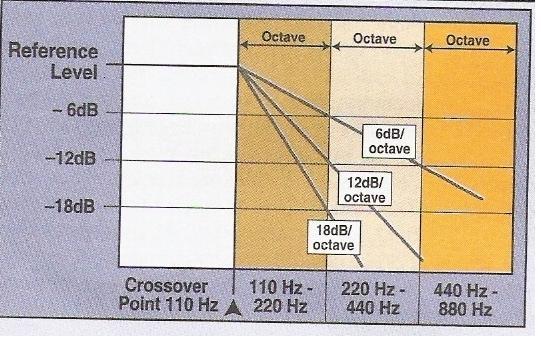12DB/octave, 24 DB???
|
Bronze Member Username: Brycew7B.C., B.C. Post Number: 62 Registered: May-06 | My amp has some settings, and i know most of them except for the 12 db per octave and 24 dc per octave? how does this affect my sub's performance, and what does it mean? |
|
Bronze Member Username: Brycew7B.C., B.C. Post Number: 65 Registered: May-06 | BUMP, can someone plz tell me what these are? |
|
Silver Member Username: N2audioLawrence, Ks USA Post Number: 884 Registered: Mar-04 | what amp? It's the crossover slope. Crossovers aren't a wall - where notes above/below the set frequency are just gone - they work on a slope. The steeper the slope (higher the number) the quicker notes above/below the set point fade away. It's personal preference more than anything. You won't hear much difference between the two. |
|
Bronze Member Username: Brycew7B.C., B.C. Post Number: 69 Registered: May-06 | It's an alpine MRD-M605, monoblock. |
|
Bronze Member Username: Brycew7B.C., B.C. Post Number: 70 Registered: May-06 | thanks, that clears up a lot of things . i thought it might have been to do with bass boost or something. |
|
Gold Member Username: IlluminatorUSA Post Number: 3152 Registered: Apr-05 | I prefer 12dB as opposed to 24dB cutoff, even though the latter is supposedly nicer. The reason I prefer the 12dB is because the frequencies blend nicer with each other and the overall system sounds complete where you can't tell where each frequency comes from. |
|
Silver Member Username: AlteraudiousaConcord Post Number: 952 Registered: Jan-06 | the DB slope refers to how the frequencies are cutoff at the next octave. Basically say at 800hz, at 400hz(octave below) it is -6db( or "x" depending on the slope) and at 1600hz it is +6db. It is hard to tell which slope will work best for your application but a 12db slope is a good place to start. I prefer a steep 18db on things such as the low pass filter for the sub(18db slope at 100hz), a 24db slope at 80hz and 6db slope at 315hz on the midrange low and high filters and a 12db slope at 400hz on the highs(which the passive crossover will seperate that to 400-3.15khz@I believe a 60db slope and 3.15khz and up). Quite complex. |
|
Gold Member Username: Dustin3Tigard, Or U.S. Post Number: 1615 Registered: Oct-05 | ^^ that made my head hurt. lol |
|
Gold Member Username: Suleman36Maryland U.S.A. Post Number: 3915 Registered: Feb-05 | I whould stay around 80hz @ 18-24db for LPF 100-125hz @ 12db slope for HPF You may lower your SUB freq to 63hz to hear the differance. Your preferance. |
|
Silver Member Username: AlteraudiousaConcord Post Number: 957 Registered: Jan-06 | yeah bass try reading about it and it'll really give you a headache. its much easier to show in a picture though so maybe i'll try that. |
|
Silver Member Username: AlteraudiousaConcord Post Number: 958 Registered: Jan-06 | here's a picture that may help how the slope works and kinda "looks". Basically a steep slope cuts off frequencies after the crossover point faster.  |
|
Gold Member Username: MixneffectOrangevale, Ca. USA Post Number: 1042 Registered: Apr-05 | I like pictures. I feel like I am at Dennys |
|
Gold Member Username: MixneffectOrangevale, Ca. USA Post Number: 1043 Registered: Apr-05 | I would have to say that I like to use 18 and 24 dB slopes when I want to stretch my speakers as close to their limit as possible. This way I do not damage the speakers at high volumes, and still get the sound I need out of them. Yes there is a drawback. Steeper slopes are more expensive, and have nasty peaks right before they start to cut. This makes the transition somewhat choppy between the sub and mid, but you have to take in consideration that the transparancy or the lack thereof is more noticable at the midrange and tweeter knee, than it is at the midrange and sub knee. IMHO I would use the 18 dB on the sub and the 24 dB on the midrange. The midrange would be at risk of damage where the sub would just play a few extra frequencies. |
Main Forums
Today's Posts- Home Audio Forum
- Home Video Forum
- Home Theater Forum
- Car Audio Forum
- Accessories Forum
- All Forum Topics